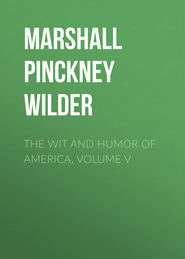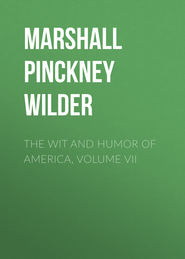По всем вопросам обращайтесь на: info@litportal.ru
(©) 2003-2024.
✖
The Wit and Humor of America, Volume VI
Автор
Год написания книги
2019
Настройки чтения
Размер шрифта
Высота строк
Поля
I was lucky enough to find Eleanor crying softly to herself in a corner of the veranda. The sight of her tears revived my fainting courage. I thought of Bruce and the spider, and waded in.
"Eleanor," I said, "I've just been seeing poor Jones off."
She sobbed out something to the effect that she didn't care.
"No, you can't care very much," I said, "or you wouldn't send a man like that—a splendid fellow—a member of one of the oldest and proudest families of Connecticut—to his death."
"Death?"
"Well, he's off for Japan to-morrow. They're getting through fifty doctors a week out there at the front. They're shot down faster than they can set them up."
I was unprepared for the effect of this on Eleanor. For two cents she would have fainted then and there. It's awful to hear a woman moan, and clench her teeth, and pant for breath.
"Oh, Eleanor, can't you do anything?"
"I am helpless, Ezra. My pride—my woman's pride—"
"Oh, how can you let such trifles stand between you? Think of him out there, in his tattered Japanese uniform—so far from home, so lonely, so heartbroken—standing undaunted in that rain of steel, while—"
"Oh, Ezra, stop! I can't bear it! I can't bear it!"
"Is the love of three years to be thrown aside like an old glove, just because—"
Her face was so wild and strained that the lies froze upon my tongue.
"Oh, Ezra, I could follow him barefooted through the snow if only he—"
"He's leaving Grand Central to-morrow at ten forty-five," I said.
She fumbled at her neck, and almost tore away the diamond locket that reposed there.
"Take him this," she whispered hoarsely. "Take it to him at once, and say I sent it. Say that I beg him to return—that my pride crumbles at the thought of his going away so far into danger."
I put the locket carefully into my pocket.
"And, Eleanor, try and don't rub him the wrong way about his name. Is it worth while? There have to be Joneses, you know."
"Tell him," she burst out, "tell him—oh, I never meant to wound him—truly, I didn't … a name that's good enough for him is good enough for me!"
The next morning at nine I pulled up my Porcher-Mufflin car before Jones' door. He was sitting at his table reading a book, and he made no motion to rise as I came in. He gave me a pale, expressionless stare instead, such as an ancient Christian might have worn when the call-boy told him the lions were ready in the Colosseum. Resignation, obstinacy and defiance—all nicely blended under a turn-the-other-cheek exterior. He looked woebegone, and his thin, handsome face betrayed a sleepless night and a breakfastless morning. I could feel that my presence was the last straw to this unfortunate medical camel.
I threw in a genial remark about the weather, and took a seat.
Jones hunched himself together, and squirmed a sad little squirm.
"Mr. Westoby," he said, "I once made use of a very strong expression in regard to you. I said, if you remember, that I'd be obliged if you'd keep your paws—"
"Don't apologize," I interrupted. "I forgot it long ago."
"You've taken me up wrong," he continued drearily. "I should like you to consider the remark repeated now. Yes, sir, repeated."
"Oh, bosh!" I exclaimed.
"You have a very tough epidermis," he went on. "Quite the toughest epidermis I have met with in my whole professional career. A paper adequately treating your epidermis would make a sensation before any medical society."
Somehow I couldn't feel properly insulted. The whole business struck me as irresistibly comical. I lay back in my chair—my uninvited chair—and roared with laughter.
I couldn't forbear asking him what treatment he'd recommend.
He pointed to the door, and said laconically: "Fresh air."
I retorted by laying the diamond locket before him.
"My dear fellow," I said, as he gazed at it transfixed, "don't let us go on like a pair of fools. Eleanor charged me to give you this, and beg you to return."
I don't believe he heard me at all. That flashing trinket was far more eloquent than any words of mine. He laid his head in his hands beside it, and his whole body trembled with emotion. He trembled and trembled, till finally I got tired of waiting. I poked him in the back, and reminded him that my car was waiting down stairs. He rose with a strange, bewildered air, and submitted like a child to be led into the street. He had the locket clenched in his hand, and every now and then he would glance at it as though unable to believe his eyes. I shut him into the tonneau, and took a seat beside my chauffeur.
"Let her out, James," I said.
James let her out with a vengeance. There was a sunny-haired housemaid at the Van Coorts' … and it was a crack, new, four-cylinder car with a direct drive on the top speed. Off we went like the wind, jouncing poor Jones around the tonneau like a pea in a pill-box. But he didn't care. Was he not seraphically whizzing through space, obeying the diamond telegram of love? In the gentle whizzle and bang of the whole performance he even ventured to raise his voice in song, and I could overhear him behind me, adding a lyrical finish to the hum of the machinery. It was a walloping run, and we only throttled down on the outskirts of Morristown. You see I had to coach him about that Japanese war business, or else there might be trouble! So I leaned over the back seat and gently broke it to him. I thought I had managed it rather well. I felt sure he could understand, I said, the absolute need of a little—embellishing and—
"Let me out," he said.
I feverishly went on explaining.
"If you don't let me out I'll climb out," he said, and began to make as good as his word over the tonneau.
Of course, there was nothing for it but to stop the car.
Jones deliberately descended and headed for New York.
I ran after him, while the chauffeur turned the car round and slowly followed us both. It was a queer procession. First Jones, then I, then the car.
Finally I overtook him.
"Jones," I panted. "Jones."
He muttered something about Ananias, and speeded up.
"But it was an awfully tight place," I pleaded. "Something had to be done; you must make allowances; it was the first thing that came into my head—and you must admit that it worked, Jones. Didn't she send you the locket? Didn't she—?"
"What a prancing, show-off, matinée fool you've made me look!" he burst out. "I have an old mother to support. I have an increasing practice. I have already attracted some little attention in my chosen field—eye, ear and throat. A nice figure I'd cut, traipsing around the battlefields in a kimono, and looking for a kindly bullet to lay me low. If I were ever tempted by such a thing—which God forbid—wouldn't I prefer to spread bacilli on buttered toast?"
"I never thought of that," I said humbly.
"I have known retail liars," he went on. "But I guess you are the only wholesaler in the business. When other people are content with ones and twos, you get them out in grosses, packed for export!"
He went on slamming me like this for miles. Anybody else would have given him up as hopeless. I don't want to praise myself, but if I have one good quality it's staying power. I pleaded and argued, and expostulated and explained, with the determination of a man whose back is to the wall. I wasn't going to lose Freddy so long as there was breath in my body. However, it wasn't the least good in the world. Jones was as impervious as sole-leather, and as unshaken as a marble pillar.
"Eleanor," I said, "I've just been seeing poor Jones off."
She sobbed out something to the effect that she didn't care.
"No, you can't care very much," I said, "or you wouldn't send a man like that—a splendid fellow—a member of one of the oldest and proudest families of Connecticut—to his death."
"Death?"
"Well, he's off for Japan to-morrow. They're getting through fifty doctors a week out there at the front. They're shot down faster than they can set them up."
I was unprepared for the effect of this on Eleanor. For two cents she would have fainted then and there. It's awful to hear a woman moan, and clench her teeth, and pant for breath.
"Oh, Eleanor, can't you do anything?"
"I am helpless, Ezra. My pride—my woman's pride—"
"Oh, how can you let such trifles stand between you? Think of him out there, in his tattered Japanese uniform—so far from home, so lonely, so heartbroken—standing undaunted in that rain of steel, while—"
"Oh, Ezra, stop! I can't bear it! I can't bear it!"
"Is the love of three years to be thrown aside like an old glove, just because—"
Her face was so wild and strained that the lies froze upon my tongue.
"Oh, Ezra, I could follow him barefooted through the snow if only he—"
"He's leaving Grand Central to-morrow at ten forty-five," I said.
She fumbled at her neck, and almost tore away the diamond locket that reposed there.
"Take him this," she whispered hoarsely. "Take it to him at once, and say I sent it. Say that I beg him to return—that my pride crumbles at the thought of his going away so far into danger."
I put the locket carefully into my pocket.
"And, Eleanor, try and don't rub him the wrong way about his name. Is it worth while? There have to be Joneses, you know."
"Tell him," she burst out, "tell him—oh, I never meant to wound him—truly, I didn't … a name that's good enough for him is good enough for me!"
The next morning at nine I pulled up my Porcher-Mufflin car before Jones' door. He was sitting at his table reading a book, and he made no motion to rise as I came in. He gave me a pale, expressionless stare instead, such as an ancient Christian might have worn when the call-boy told him the lions were ready in the Colosseum. Resignation, obstinacy and defiance—all nicely blended under a turn-the-other-cheek exterior. He looked woebegone, and his thin, handsome face betrayed a sleepless night and a breakfastless morning. I could feel that my presence was the last straw to this unfortunate medical camel.
I threw in a genial remark about the weather, and took a seat.
Jones hunched himself together, and squirmed a sad little squirm.
"Mr. Westoby," he said, "I once made use of a very strong expression in regard to you. I said, if you remember, that I'd be obliged if you'd keep your paws—"
"Don't apologize," I interrupted. "I forgot it long ago."
"You've taken me up wrong," he continued drearily. "I should like you to consider the remark repeated now. Yes, sir, repeated."
"Oh, bosh!" I exclaimed.
"You have a very tough epidermis," he went on. "Quite the toughest epidermis I have met with in my whole professional career. A paper adequately treating your epidermis would make a sensation before any medical society."
Somehow I couldn't feel properly insulted. The whole business struck me as irresistibly comical. I lay back in my chair—my uninvited chair—and roared with laughter.
I couldn't forbear asking him what treatment he'd recommend.
He pointed to the door, and said laconically: "Fresh air."
I retorted by laying the diamond locket before him.
"My dear fellow," I said, as he gazed at it transfixed, "don't let us go on like a pair of fools. Eleanor charged me to give you this, and beg you to return."
I don't believe he heard me at all. That flashing trinket was far more eloquent than any words of mine. He laid his head in his hands beside it, and his whole body trembled with emotion. He trembled and trembled, till finally I got tired of waiting. I poked him in the back, and reminded him that my car was waiting down stairs. He rose with a strange, bewildered air, and submitted like a child to be led into the street. He had the locket clenched in his hand, and every now and then he would glance at it as though unable to believe his eyes. I shut him into the tonneau, and took a seat beside my chauffeur.
"Let her out, James," I said.
James let her out with a vengeance. There was a sunny-haired housemaid at the Van Coorts' … and it was a crack, new, four-cylinder car with a direct drive on the top speed. Off we went like the wind, jouncing poor Jones around the tonneau like a pea in a pill-box. But he didn't care. Was he not seraphically whizzing through space, obeying the diamond telegram of love? In the gentle whizzle and bang of the whole performance he even ventured to raise his voice in song, and I could overhear him behind me, adding a lyrical finish to the hum of the machinery. It was a walloping run, and we only throttled down on the outskirts of Morristown. You see I had to coach him about that Japanese war business, or else there might be trouble! So I leaned over the back seat and gently broke it to him. I thought I had managed it rather well. I felt sure he could understand, I said, the absolute need of a little—embellishing and—
"Let me out," he said.
I feverishly went on explaining.
"If you don't let me out I'll climb out," he said, and began to make as good as his word over the tonneau.
Of course, there was nothing for it but to stop the car.
Jones deliberately descended and headed for New York.
I ran after him, while the chauffeur turned the car round and slowly followed us both. It was a queer procession. First Jones, then I, then the car.
Finally I overtook him.
"Jones," I panted. "Jones."
He muttered something about Ananias, and speeded up.
"But it was an awfully tight place," I pleaded. "Something had to be done; you must make allowances; it was the first thing that came into my head—and you must admit that it worked, Jones. Didn't she send you the locket? Didn't she—?"
"What a prancing, show-off, matinée fool you've made me look!" he burst out. "I have an old mother to support. I have an increasing practice. I have already attracted some little attention in my chosen field—eye, ear and throat. A nice figure I'd cut, traipsing around the battlefields in a kimono, and looking for a kindly bullet to lay me low. If I were ever tempted by such a thing—which God forbid—wouldn't I prefer to spread bacilli on buttered toast?"
"I never thought of that," I said humbly.
"I have known retail liars," he went on. "But I guess you are the only wholesaler in the business. When other people are content with ones and twos, you get them out in grosses, packed for export!"
He went on slamming me like this for miles. Anybody else would have given him up as hopeless. I don't want to praise myself, but if I have one good quality it's staying power. I pleaded and argued, and expostulated and explained, with the determination of a man whose back is to the wall. I wasn't going to lose Freddy so long as there was breath in my body. However, it wasn't the least good in the world. Jones was as impervious as sole-leather, and as unshaken as a marble pillar.








